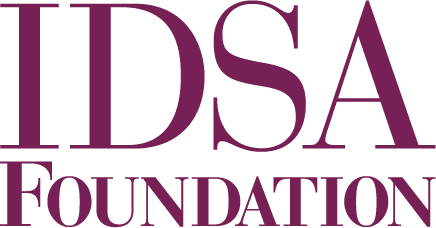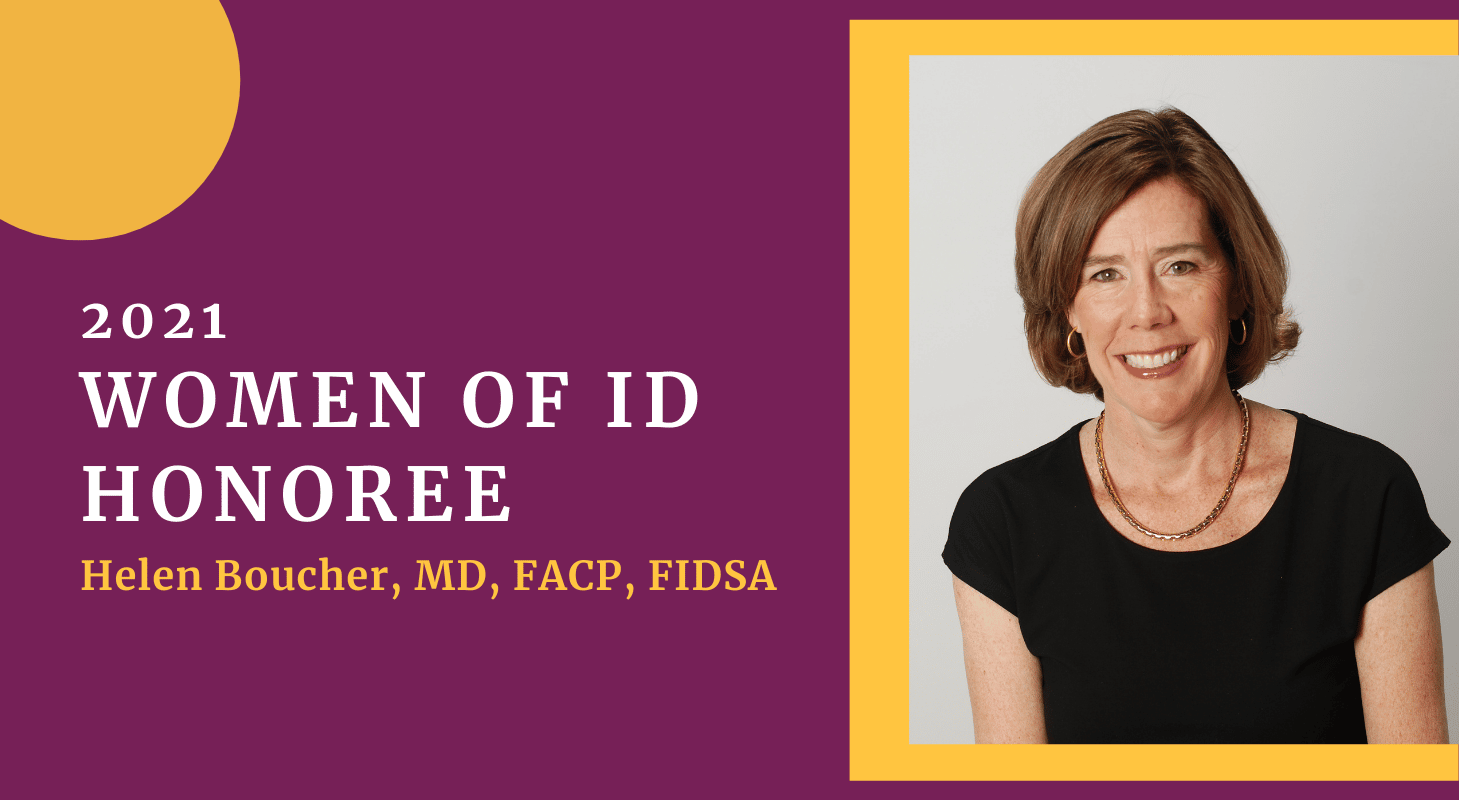Helen Boucher, MD, FACP, FIDSA: A Woman of ID
If you’ve ever wondered whether a career in infectious diseases can involve stimulating lab work, a job at a major pharmaceutical company, your own clinical practice and a leadership position at an internationally respected medical center, all while balancing family and pursing your passion, ask Helen Boucher, MD, FACP, FIDSA.
Dr. Boucher’s work has taken her from a lab in Boston to consulting opportunities in the U.K. and now to Tufts University School of Medicine, where she was recently appointed interim dean.
A self-described joiner since an early age, Dr. Boucher also volunteers her time to numerous professional organizations, has served on IDSA’s Board of Directors and is the IDSA Foundation’s outgoing treasurer.
In honor of her accomplishments in ID and her commitment to cultivating and mentoring the next generation of ID specialists, the Foundation is proud to recognize Dr. Boucher as a 2021 Women of ID honoree. We asked Dr. Boucher to tell us more about her love for transplant ID, passion for mentorship and the power of saying “yes” to getting involved.
What made you decide to pursue a career in infectious diseases?
My interest in ID began during my training at Beth Israel Deaconess Medical Center, which was a big transplant center. I had a hard time deciding whether to pursue internal medicine or surgery. I chose internal medicine, and as it turned out, the physician-in-chief during my training was infectious diseases physician Bob Moellering, Jr., MD, a giant in ID who has been incredible to me over the years. I ultimately decided on a career in infectious diseases because of mentors like him.
Over the course of my training, I became interested in transplant patients and related infections. However, my career took a turn when I was a junior faculty member. My husband was transferred to England, so I went to work on an antifungal drug for patients with transplants and other forms of immune suppression. That really cemented my love for that kind of work. When I came back to Boston, I was recruited to Tufts Medical Center to specialize in transplant ID, which is what I’ve done ever since.
I love this subspecialty. The number one cause of death after transplant is infection, but patients at death’s door can be saved with a transplant and live normal lives if we can keep them infection free. Our role as infectious diseases specialists is vital. We’re a part of a much bigger team, and our work only succeeds if the team succeeds.
All throughout my career, I’ve also worked on antibiotic resistance research and the development of new antibiotics and antifungal drugs. That fits in beautifully with my clinical interest in transplant ID.
Can you tell us a bit more about your mentors and how they impacted your career?
Being a physician is a career, but it’s also a calling. It’s different than other jobs. It’s important to get the resources you can to help you have a meaningful career experience, and I think mentorship is one of those resources.
Along the way, I’ve met many mentors. In addition to Bob Moellering, Jr., MD, there was also Adolf W. Karchmer, MD; George Eliopoulos, MD; Tom Patterson, MD; and Louis Rice, MD.
When consulting and working in antimicrobial drug development, Michael Dunne, MD, FIDSA, was one of my bosses and certainly a mentor to me.
Here at Tufts, there were individuals like Frank Talley, MD; David Snydman, MD, FACP, FIDSA, FAST; and Sherry Gorbach, MD.
Through IDSA, I was invited to join the Antimicrobial Availability Task Force, and John G. Bartlett, MD, FIDSA; David Gilbert, MD, MACP, FIDSA; George Talbot, MD, FACP, FIDSA; and John Bradley, MD, really took me under their wing, taught me, included me and gave me opportunities.
And even people outside of the medical profession have taught me so much, like Amanda Jezek, senior vice president of public policy and government relations at IDSA. She has taught me an incredible amount about advocacy.
I’ve named a lot of people, but there are certainly more who have been there for me along the way. That’s one of the best things about our field. Every single person I’ve ever reached out to has talked to me. All you have to do is ask, and you will find people who are willing to help and who can become great mentors.
Which women in the field of ID have inspired you?
There are a number of women who are just rockstars in the field. One of my most important female mentors was Barbara Murray, MD. I can still remember the first time I met her. I was so impressed! I’ve been fortunate to get to know her as a friend.
There are many others, including Jeanne Marrazzo, MD, MPH, FACP, FIDSA; Trish Perl, MD, MSc; Jan Patterson, MD, MS; Louise Ivers, MB, BCH, BAO, MD, MPH, DTM&H; Julie Gerberding, MD, MPH; and of course, Rochelle Walensky, MD, MPH, FIDSA, who is a friend I certainly admire.
Why do you believe it is important to invest in the next generation of ID professionals?
Nothing is more important than building the next generation of ID physicians, and we’ve learned that in spades during the COVID-19 pandemic. We need the best ID physicians to prepare, prevent and respond to the next pandemic in every way, from caring for patients to running labs to communicating the importance of our specialty.
Getting young people excited about ID is something I take seriously, and I spend a lot of time with people at every stage, from high school and college students to residents and fellows. So many people were kind to me and took an interest in me, so I try to give back and let people know what a great career this is, what a huge opportunity it is to get to do ID and how many choices you can have if you choose to enter this field.
In what ways does the IDSA Foundation support the field of infectious diseases?
IDSA and the Foundation provide incredible support to ID physicians like me, and the Foundation in particular is vitally important to developing the workforce. It provides resources for medical students and early career professionals through the IDWeek Mentorship Program, the Student Interest Groups Grant Program and research funding. I’m a very strong advocate of the Foundation, and I’m excited to see it grow so we can continue to deliver on its mission in a meaningful way.
What advice would you give young women considering a career in ID?
Keep an open mind and learn as much as you can. The beauty of ID is that if you have good training, you’re qualified to do a variety of jobs, from ICU to microbiology to drug development. You can pivot in your career for reasons that you choose or reasons that life chooses. Some of the pivots in my career ended up being the best thing that ever happened to me.
Additionally, as women we face certain challenges, and I think it’s important to find a role model and mentor with whom you can talk about things like work-life balance, your kids or whether to choose part-time or full-time work. Those are very real issues. It’s also important to know that it’s possible to have a family and still have a successful, meaningful career and achieve leadership roles. I am extremely grateful to my husband, Norm, and daughters Caroline and Allie for all their support!
What do you hope to see for the future of your career and for the field of infectious diseases?
I’d like to see a clear understanding that ID physicians are the experts on antibiotics, pandemics and all things infectious diseases. I think it’s important that the spokesperson for these issues is an ID physician. That’s going to take a lot of work in developing our workforce, which means we must invest in mentorship and recruitment.
I’m thrilled about the work that’s happening, and I’m sure it will happen. Not even in 20 years but sooner. We are at a very historic moment coming out of the pandemic where the need and value of ID physicians has been made clear, so we need to capitalize on that, and I believe we will.
For me, personally? On July 1, I stepped into a new role as the interim dean of our medical school and the chief academic officer of Tufts Medical Center’s parent health system, Wellforce. I’m excited about my new role and the potential of helping the next generation of doctors. I’m inspired by our students and faculty, and I love what I’m doing. I don’t actually know where my path will go, but I’m excited about it, and I know that I will always be an ID physician.
What does the Women of ID honor mean to you?
As a woman in infectious diseases, I am incredibly fortunate that I’ve had the opportunity to get into a leadership role in our specialty, and I’m acutely aware that we still have more work to do for women leaders. IDSA and the Foundation are committed to inclusion, diversity, equity and access, and I see this through initiatives like the Women of ID program. I’m grateful to be honored, and I hope this shows that as a woman in ID, you can find a work-life balance and still achieve a meaningful and successful career.
—
About Dr. Boucher
Helen Boucher, MD, FACP, FIDSA, serves as interim dean and a professor of medicine at Tufts University School of Medicine and as chief academic officer for Wellforce, a system of health care providers stretching from Cape Cod to beyond the New Hampshire border. Dr. Boucher was formerly the chief of the Division of Geographic Medicine and Infectious Diseases at Tufts Medical Center and was a director of the Stuart B. Levy Center for Integrated Management of Antimicrobial Resistance (Levy CIMAR). Dr. Boucher served as an IDSA board member and IDSA Foundation treasurer. Her clinical focus is on transplant infectious diseases, and her research has focused on antimicrobial drug development.
To support the Women of ID – past, present and future – please consider making a gift to the Foundation today.

